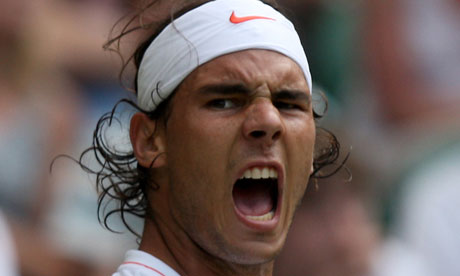 The two questions that occupied tennis sages in the first week of Wimbledon – almost as much as how long an umpire can go without a toilet break – were: what's wrong with Rafa Nadal and what's wrong with Roger Federer?
The two questions that occupied tennis sages in the first week of Wimbledon – almost as much as how long an umpire can go without a toilet break – were: what's wrong with Rafa Nadal and what's wrong with Roger Federer?We will know the answers soon enough. Nadal is first back in the dock tomorrow afternoon for what ought to be a gentle inquisition by the unseeded and surely exhausted Frenchman Paul-Henri Mathieu on Court One.
Mathieu dropped a set getting past his 121st‑ranked compatriot Marc Gicquel, which was not an encouraging start; he then toughed it out in a five-set upset of the 14th seed Mikhail Youzhny, before going four sets with the stubborn Thiemo de Bakker.
The Dutchman, remember, had left so much on court seeing off Santiago Giraldo in the first round but dredged up enough to knock out the real marathon man, John Isner, en route to Mathieu. So Mathieu comes to the last 16 very much battle weary. He is there for the taking. Yet nobody imagined Nadal would struggle over five sets the way he did against the No33 seed Philipp Petzschner yesterday, for instance – even if there were cracks in his tennis in his previous match, a five‑setter against the Dutchman Robin Haase, ranked 151st in the world.
If the No2 seed does not return to his domineering best there will be more questions – not so much about his tennis, but his tender knees.
Petzschner was initially livid and only later mollified when Nadal took a couple of physio breaks that revived his energy and interrupted the German's momentum. Nadal denied vehemently that he had indulged in gamesmanship – "I never call the physio when I have nothing, not one time in my career," he objected – but, in a lengthy reply, he admitted finally that he is worried about his chronic tendinitis. "Sure, I am a little bit scared about the knee," he said.
He revealed the problem had flared up when he lost to Andy Roddick in Miami and that he had had treatment after winning in Monte Carlo in April. He did not, he said, want to use the nagging knee as an excuse.
It is a serious concern for Nadal, though – and for tennis – the sort of long-term injury that could cut short not only his Wimbledon campaign but his career.
The Spaniard, nevertheless, should remain on course for a quarter-final against Robin Soderling, and possibly Andy Murray in the semi-finals.
I had expected Nadal to win this tournament, on the assumption that he had managed his fragile knees well in the course of winning four clay‑court titles and after witnessing him consistently hit peaks of excellence that even Federer would struggle to counter in defence of the Wimbledon title.
When Nadal demoralised Soderling in the final of the French Open, he destroyed a man who only two games earlier had destroyed Federer. The Spaniard was playing so well he had taken the surface out of the equation. If they wanted to play on a giant marshmallow he would have turned back all challengers.
Federer, meanwhile, is physically indestructible yet vulnerable here, as he has been all season. He has not won a slam since beating Murray in Melbourne, had his streak of 23 semi-finals in slams snapped in Paris and lost for only the second time on grass in 73 matches when Lleyton Hewitt, himself recovering from a recent hip operation, upset him at Halle two weekends ago.
At Wimbledon, which is his personal fiefdom, as he stands on the verge of equalling Pete Sampras's record of seven titles, he has had an even bigger nightmare than Nadal. When he dropped two sets to the Colombian clay‑court upstart Alejandro Falla on the opening day, tennis held its collective breath. This, surely, could not be happening.
He escaped, then dropped another set in getting past the ebullient but erratic Serb Ilija Bozoljac before settling into a more familiar rhythm in the third round, against the 32-year-old Frenchman Arnaud Clément, in truth no great ask.
Now he faces the 16th seed Jürgen Melzer, whose four-set win over the Spaniard Feliciano Lopez – Nadal's conqueror at Queen's – was impressive.
In all likelihood, Federer and Nadal will survive, thrive even. They are, after all, the two best players in the world. They have come through worse crises.
All of which assumes, of course, that form, class and logic count for anything. That has not been the case for much of this tournament.
No comments:
Post a Comment